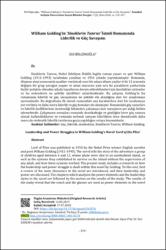William Golding’in ‘Sineklerin Tanrısı’ İsimli Romanında Liderlik ve Güç Savaşımı
Abstract
Sineklerin Tanrısı, Nobel Edebiyat Ödüllü İngiliz roman yazarı ve şair William Golding (1911-1993) tarafından yazılmış ve 1954 yılında yayımlanmıştır. Romanda, düşman ateşi sonucunda uçakları vurularak ıssız bir adaya düşen yaşları 6 ile 12 arasında değişen bir grup çocuğun yaşam ve umut macerası yanı sıra bu çocukların yanlarında hiçbir yetişkin olmadan adada hayatlarını devam ettirebilmeleri için kurdukları sistemler ve bu sistemlerin ne şekilde işledikleri anlatılmaktadır. Bu çalışma, Golding’in bu romanında liderlik ve güç savaşımının ne şekilde ele alındığına dair bir araştırmayı içermektedir. Bu doğrultuda ilk olarak romandaki ana karakterlere dair bir incelemeye yer verilmiş ve daha sonra liderlik ve güç konuları ele alınmıştır. Romandaki güç unsurları ve liderlik özelliklerinin incelendiği bölümleri, çalışmaya dair sonuçların yer aldığı bölüm izlemektedir. Çalışmanın sonuçları romanda denizkabuğu ve gözlüğün birer güç unsuru olarak kullanıldıklarını ve romanda serbesti tanıyan liderlikten önce demokratik daha sonra da otokratik liderlik tarzlarına geçiş yapıldığını ortaya koymaktadır. Lord of Flies was published in 1954 by the Nobel Prize winner English novelist and poet William Golding (1911-1993). The novel tells the story of the adventure a group of children aged between 6 and 12, whose plane were shot in an uninhabited island, as well as the systems they established to survive on the island without the supervision of any adult, and how these systems worked. The present study includes a research on how the leadership and power struggle is dealt within this novel by Golding. To this end, first a review of the main characters in the novel are introduced, and then leadership and power are discussed. The chapters which analyzes the power elements and the leadership styles in the novel are followed by the section on the results of the study. The results of the study reveal that the conch and the glasses are used as power elements in the novel and leadership styles on the novel are laissez faire leadership, democratic leadership and autocratic leadership.
Volume
7Issue
2The following license files are associated with this item:


















